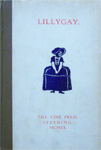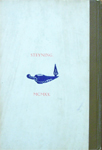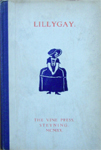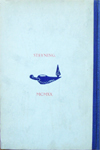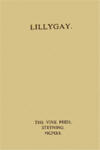100th
MP

|
THE
100th
MONKEY
PRESS |
|
|
|
Limited Editions by Aleister Crowley & Victor B. Neuburg |
|
Bibliographies |
|
Download Texts
»
Aleister
Crowley
WANTED !!NEW!!
|
|
LILLYGAY |
|
Image Thumbnails |
||||||||||||||||||||||||||||||||||||
|
Title: |
Lillygay |
Cover State (a) Rear State (a) Spine State (a)
Cover State (b)
Rear State (b)
Spine State (b)
Title Page
Limitation Page
Cover State (c)
|
||||||||||||||||||||||||||||||||||
|
Variations: |
|
|||||||||||||||||||||||||||||||||||
|
Publisher: |
The Vine Press. |
|||||||||||||||||||||||||||||||||||
|
Printer: |
Vine Press. |
|||||||||||||||||||||||||||||||||||
|
Published At: |
Steyning and London. |
|||||||||||||||||||||||||||||||||||
|
Date: |
circa September 1920. |
|||||||||||||||||||||||||||||||||||
|
Edition: |
First Edition. |
|||||||||||||||||||||||||||||||||||
|
Pages: |
xi + 78. |
|||||||||||||||||||||||||||||||||||
|
Price: |
State (a) priced at 42 shillings. State (b) priced at Six shillings sixpence. |
|||||||||||||||||||||||||||||||||||
|
Remarks: |
The poems Lilly-white, Rantun-Tantum and Sick Dick were written by Neuburg. Original woodcut illustrations on cover and throughout the book were designed and cut by Eric and Percy West. The title-page, prologue and colophon are printed in red and black. Issued with dust wrapper. Printed by hand on Victor Neuburg’s printing press. |
|||||||||||||||||||||||||||||||||||
|
Pagination: |
|
|||||||||||||||||||||||||||||||||||
|
Contents: |
- Dedication - Prologue - The Distracted Maid - Eloré lo - Bonfire Song - Burd Ellen and Young Tamlane - The Gowans Sae Gae - Lilly-white - Johnnie Faa - Sick Dick - A Lyke-Wake Dirge - Johnnie wi’ the Tye - The Shoemaker - Rantum-Tantum - Epilogue. - Colophon |
|||||||||||||||||||||||||||||||||||
|
Author’s Working Versions: |
|
|||||||||||||||||||||||||||||||||||
|
Other Known Editions: |
||||||||||||||||||||||||||||||||||||
|
Reviews: |
The Vine Press at Steyning has produced interesting work, typical of this free and enjoyable period, and its first book, Lillygay, issued in 1920, expresses the character of what followed. It is an anthology of anonymous poems. The woodcuts by Percy West are cheerful and chapbook in style, like Tuer’s books from the late nineteenth century or Lovat Fraser’s more recently, or Jack Yeats in the Cuala Broadsheets. Forty special copies were bound delightfully in pink paper boards and green buckram back, with printed labels and hand coloured. The type is nothing to write home about but the book is a success—ballads and rough woodcuts, the beautiful and carefree colouring. —The Private Presses, Colin Franklin. ______________________________
The Vine Press also issued “Lillygay” (5s), an anthology of anonymous poems edited and compiled by the author of “Swift Wings,” with some excellent woodcuts contributed by Eric and Percy West. Decidedly unusual and perhaps rather daring in the eyes of the “unce’ guid,” these old-world ballads have a racy character and rich promise about them that is original and attractive. Here are collected such ancient masterpieces as “Johnnie Faa,” “The Gowans Sae Gae,” “Burd Ellen,” and “Elore Lo,” the innocent, light-hearted amorism of “Bonfire Song” and “Rantum Tantum,” the by no means mealy-mouthed “Sick Dick,” which is as clever as it is funny, and the exquisite “Lyke-Wake Dirge,” with its dire, forbidding Catholicism. Most of these poems tell of bygone times and manners, but a few at least, such as the lovely “Colophon,” are modern in tone and in expression. They are, as the prologue says: “Tonguefuls of words, but new words of a new world, newly coloured by the angel of a new time. —The Aberdeen Press and Journal, 21 March 1921. ______________________________
Occasionally—at intervals far too long, alas!—there reaches the sad groaning tables of reviewers a little volume whose charm and distinction brings with it the freshness and surprise of a May Queen dancing into a committee meeting of frowsy kill-joys or a jolly young Bacchus raiding the headquarters of the Pussy-foots. There have only been five of these occasional volumes, including a sort of distant relative which, being outside the series, I do not mention here. They come modestly into the world, receive a really notable appreciation from some of our few discriminating reviewers, and pass, no less modestly, into, I imagine, the goodly company of books kept by our connoisseurs. For modesty is the one natural raiment of these volumes. The title-pages bear the imprint “The Vine Press, Steyning,” which is just sufficient to tell you whence, in Sussex, you may secure copies. Indeed, beyond that, in none of them except the “distant relation” and the fifth shall you find any clue as to authorship or editorship. On the other hand, you will not need to look over many pages to find verses of perfect and captivating tune—idylls that make the pipes of Pan flute again over the years that are still. Much of the verse is the work of a poet who can express himself in a fine lyric measure, of one who is steeped in folklore, and of one who can distil the golden classics not merely as a translator but as a creative artist; the remaining verse, some of it little known and precious, is by poets with similar qualities, the selection showing a very extensive sympathetic knowledge. The first of these volumes was Lillygay, an anthology of anonymous poems which a writer in an early November Number of The Bookman’s Journal hailed as “a benediction of a book—a book eternal” in whose pages the reader might “re-capture lost May Days and lost pay-days.” Nest, a year later, appeared the anonymous Swift Wings: Songs in Sussex, containing some rich melodies which more than maintained the promise of the original work in the previous volume and augured well for the future. Songs of the Groves, the successor (1921), was in some ways a more ambitious work, in which the author, still veiling himself, in achieving some finer moments in his songs and translations frequently ran the full course of his unrestrained themes of Arcadian loves and passions. The latest volume is Larkspur: A Lyric Garland, by various hands. These books are issued in certified ordinary editions of 550 copies, each numbered, printed on antique laid paper, for a few shillings each; with editions de-luxe limited to 40 copies on handmade paper, the woodcut decorations hand-coloured, numbered and signed. There is a very individual note in the production of these books, and though they offer points for typographical criticism, the founts of type used and the arrangement are in effective harmony with the verse. The woodcuts, variously by Eric and Percy West, are crude (though better in some of the later examples), but there is character in them which makes their very crudeness delightful. Altogether, one feels in handling the volumes that they have been dreamed over, and planned, and dreamed over again: they are instinct with the spirit of the verse of the Dedication in Larkspur—
So to the Rose of Beauty, The Heart in each Star impearled, Is sung the Artist’s duty, The Poet’s love for his world.
As for Larkspur, the recent publication of which is the occasion for the above notes, this book is a departure from the previous ones in the series. An anthology, the poems—with the exception of the Dedication, Prologue, Epilogue and Colophon—are this time ascribed, the “contributors” being given as Tom D’Urfey, John Norris, Robert Greene, Dr. James Smith, John Keats, Chrystopher Crayne, Aphra Behn, Edward Moore, Paul Pentreath, Nicholas Udall, William Drummond, Edmond Waller, Harold Stevens, Laurence Edwards, Arthur French, and Nicholas Pyne. Now, there are some names here that we know well enough; but there are others for which we may search the British Museum until we tread on our beards without ever tracing the authors and their alluring lines. I would fain pursue this matter now, but I leave it until I have more space and liberty. Keats? I wonder how many lovers of Keats know a five-stanza poem credited to him, “Sharing Eve’s Apple,” whose last verse is:—
There’s a sigh for yes, and a sigh for no, And a sigh of I can’t bear it! O what can be done, shall we stay or run? O cut the sweet apple and share it.
Larkspur, with its known and unknown singers, is a book to transport the reader to the woods and their spirits
Rose-leaves rustle And poppy-leaves fall; Oak-boughs tussle And rude rooks brawl
And to far-off things which are the best things and near enough for those who sing with “The Amorous Shepherdess” (by Chrystopher Crayne)
O come my deare! Thy Love is here, And waits the silver straines Of thy sweete Pipe Nowe Sprynge is rype, Come with the firste new Raines.
There is no better recommendation than to say that Larkspur will go with its predecessors to join the goodly company of books sought by those who delight in these “Songs of ripe-lipped love and of honey-coloured laughter: old lamps for new: ancient lights.” —The Bookman's Journal, March 1923. |
|||||||||||||||||||||||||||||||||||
